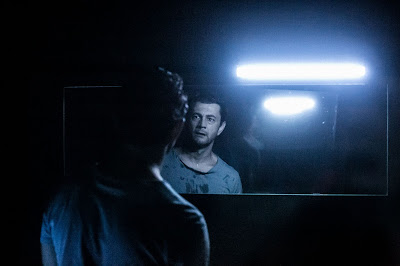Ah, kids, and the things they can up to! What those of THE SILENT REVOLUTION get up to during their final year of high school in East Germany back in 1956 begins as something of a lark, as well as a genuine and sympathetic feeling for those young people active in the protests taking place in Communist-controlled Hungary. The Berlin Wall hadn't even been built back then, so access between East and West Berlin was easier than it would be a few years hence.
What a couple of students see during the newsreel portion of the screening they have snuck into in a West Berlin movie house -- footage of the Hungarian Revolution they would never be allowed to view in their home country of East Berlin, now controlled by the USSR -- influences them to talk their classroom into staging a couple of minutes of silence to honor the Hungarian protesters.
That's all. Nothing special. No big deal.
Based on a real situation that arose in this particular classroom, the movie -- directed and adapted (from the book by Dietrich Garstka) by Lars Kraume, shown above -- turns out to be one of the more compelling, engrossing and moving films I've seen this year.
In fact, the film is right up there with Oscar-winner The Lives of Others in the detailed manner in which it captures life under Communist rule: when anyone -- say, those two boys who go to the movie theater (Theo, played by Leonard Scheicher, above, and Kurt (Tom Gramenz, below) -- proves foolish enough to, even slightly, question that rule.
As the kids' two minutes of "solidarity" slowly becomes "counter-revolution," once the higher-ups -- from teachers to principal to government flunkies and ugly high-level bureaucrats -- become involved, things turn simultaneously ridiculous and frightening, as entire families' lives begin to disintegrate.
The Silent Revolution is particularly good at demonstrating the ways in which this Communist/Fascist bureaucracy invades and threatens the individual, and as this threat increases and the kids are further worn down, your blood will start to boil.
Herr Kraume refuses to make the students simply good or bad; all of them are mixed bags, managing wrong and right as best they can and for reasons that are genuine but sometimes flawed. They try their best to present a united front, but their masters engage in lies and betrayal to break them.
The student for whom all this takes the greatest toll is Erik (dazzlingly portrayed by Jonas Dassler, above and below, left), whose journey from belief to belittlement is excruciating and surprisingly moving. Getting to the truth is one thing but getting any kind of justice is quite another
The film's Spartacus-like climax is just fine, but it's the very final moments that seal the deal. "I'm getting goosebumps," my spouse exclaimed, as The Silent Revolution came to its brilliant, beautiful, breathtaking end. I think you will remember these kids and their predicament for a good long time.
From Distrib Film US and released via Icarus Home Video, the movie -- in German with English subtitles and running 111 minutes -- hits the street on DVD and via VOD this Tuesday, October 1 -- for purchase and/or rental.























































